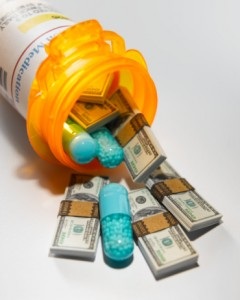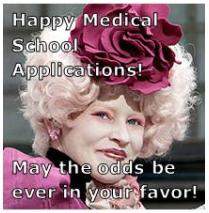When you go from lying down or sitting to standing, gravity pulls the blood in your veins towards your legs and the blood is 'pooled' there. This results in less blood returning to your heart (since they are pooled in your veins) and less blood being pumped out of your heart into your arteries. This causes a decrease in your arterial blood pressure (the dizzy feeling) which is quickly sensed by baroreceptors in your carotid artery.
The barorecepotrs direct the brain to increase sympathetic stimulation in order to return your blood pressure and the blood being pumped out of your heart to normal. Your heart will pump harder and beat faster (to get more blood into circulation). Your blood vessels will constrict (increase blood pressure and increase venous return to the heart). These responses all return blood pressure to normal.
One way to quickly stop feeling dizzy is to move your legs after you stand up. Contraction of the muscles in you legs help the venous blood return to your heart faster.
Source:
Physiology (2nd ed.) by Linda S. Costanzo
 Almost always, one drug can have multiple names. This becomes confusing when it comes time to select over-the-counter medications. For example, the very well known drug Tylenol, can also be known as acetominophen and/or non-aspirin pain reliever. So... What's the Difference?When a drug is first marketed, it is given a brand name by the company that produced it. During the time that the patent for the drug is effective, no other companies are allowed to make that drug. However, once the patent time is up (usually around 20 years), other companies are allowed to make similar versions of the drug. These become the generic drugs. Generic drugs contain the same active ingredient(s) as the original and are required to have the same level of safety and efficacy by the FDA. In essence, they are the same drug as the original. Generic drugs have different inactive ingredients as the original drug because they cannot be 100% identical. This explains why brand name drugs and their generic drug counterparts often do not look the same. Another important difference is that generic drugs are always cheaper than the brand name drug, so choosing the generic version of the drug will save you a lot of money. In writing, the names of brand name drugs are written with the first letter capitalized. Ex: Tylenol, while the names of generic drugs are written in all lowercase. Ex: acetominophen. (However, this may not be the case on drug bottles or boxes). How To Find the Generic Drug of a Brand Name DugIf you're at the store, look for the brand name drug you need and find the active ingredient on the back of the box. The generic drugs for the brand name drug are always placed next to the brand name drug and they are always cheaper. Check the active ingredient(s) of the nearby drugs. If the active ingredient(s) are the same, you've found the generic drug. If you're at home, you can always search online for the different generic drugs by typing in "generic drug for [insert brand name drug]". For more information, visit the FDA's website.
 SPF, also known as Sun Protection Factor, measures how well a sunscreen can protect against skin damage from UV radiation. Sunscreens are made up of various organic and inorganic compounds. These compounds are able to absorb UV radiation and release its energy in the form of heat. Most sunscreens indicate a SPF value. This value represents the ratio of the amount of UV radiation required to cause erythema (redness of the skin) on sunscreen protected skin to the amount of UV radiation required to cause erythema without the sunscreen. For example, if it normally takes you ten minutes under the sun to develop skin redness, wearing a sunscreen with SPF 15 will allow you to be under the sun for 10 x 15= 150 minutes before developing skin redness. Therefore, sunscreens with higher SPF values tend to be more efficient at protecting the skin from UV damage than sunscreens with low SPF values.
Reference:
El-Boury, S., Couteau, C., Boulande, L., Paparis, E., & Coiffard, L.J.M (2007). Effect of the combination of organic and inorganic filters on the Sun Protection Factor (SPF) determined by in vivo method. International Journal of Pharmaceutics, 340: 1-5.
Image source:
http://www.skincancer.org/prevention/sun-protection/sunscreen
 Although I've often tried the "slow and steady" approach to studying for an exam, I, like many others, have often found myself struggling with this strategy and preferring the "last minute" approach. There may be some logic to why this strategy might work.
Stress associated with exams is usually highest right before an exam. Studies have shown that (up to a certain point) there is a positive association between level of stress and efficiency in learning and memory. This is because stress induces the release of certain hormones in the central nervous system that help improve memory.
However, stress only seems to be able to improve memory under the following conditions:
1) When it is present at the time of learning and/or memorization.
2) When the stressful situation is directly related to what is to be learned.
On the contrary, high levels of stress before or after the learning event may actually decrease learning and memorization.
Therefore, the most efficient studying may be accomplished right before an exam, which explains why some people may prefer cramming to the "slow and steady" approach.
Reference:
Joels, M., Pu, Z, Wiegert, O., Oitzi, M.S., & Krugers, H.J. (2006). Learning under stress: how does it work? TRENDS in Cognitive Science, 10(4): 152-158.
The 2012-2013 cycle of medical school applications is about to start so I want to put up a blog about how this process works, what you can expect, and some tips that may help first time applicants build a successful application. AMCAS ApplicationAll medical school applicants need to fill out the AMCAS application (aka primary application). You select which specific medical schools you are applying for on the application, and the completed application will be forwarded to all those schools. The application opens on May 1st for every new application cycle. The earliest date to submit the application is June 1st. I highly recommend you to submit the AMCAS as early as possible. The later you submit, the longer it takes to get your application verified, the later you will be able to complete your medical school application and the greater your chances of letting your interview spot get taken by someone else. (Note: if you are an extremely strong applicant this will not affect you, but only if you are an outstanding applicant). You should request your transcript and letters of recommendation sent to AMCAS asap. The most time consuming portion of the AMCAS application is the personal statement. The prompt is usually something along the lines of why you want to become a physician. Try to get at least a few people to read your personal statement before submitting it. Once you have submitted your application, the AAMC will verify your application (usually no changes are necessary). Once it is verified, your application will be forwarded to all the schools you selected. If you procrastinated (like I did) on submitting the AMCAS application, it will take a few weeks for them to process it. You can estimate the time that your application will be verified by following the AMCAS Verification Thread on studentdoctor.net.
Secondary ApplicationAfter receiving your verified primary application, most schools will send you a link to fill out their school's supplemental application, also known as the secondary application. Some schools will filter which applicants to send secondary applications, but most schools will send secondaries to all applicants (and yes, there is an additional fee for each secondary). You can get a head start on the secondary applications since most of the prompts will be posted up on studentdoc by other applicants who have received them. Application complete. Now what?Once your application is complete, just sit back and wait for the interview invites. If you have a top choice for a school, you can always send updates and letter of interests. Interview invites can be extended to as late as March so don't be discouraged if you do not receive many invites immediately. Also, every school looks for different qualities in applicants. Finally I'd like to wrap up this post wishing you all the best of luck. :) Feel free to contact me with any questions.
|







